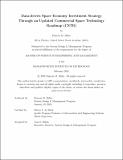| dc.contributor.advisor | de Weck, Olivier L. | |
| dc.contributor.author | Miller, Duncan M. | |
| dc.date.accessioned | 2024-04-02T14:54:17Z | |
| dc.date.available | 2024-04-02T14:54:17Z | |
| dc.date.issued | 2024-02 | |
| dc.date.submitted | 2024-03-08T19:42:37.311Z | |
| dc.identifier.uri | https://hdl.handle.net/1721.1/153992 | |
| dc.description.abstract | The innovation and growth of the space industry over the past two decades has led experts to refer to this period as the "Second Space Race"[1]. The space market is projected to reach $1 trillion in 2030, up from just $280 billion in 2010[2]. During this growth, the landscape of the space sector has shifted from a market dominated by state-run agencies to a booming commercial enterprise that offers seemingly endless possibilities and applications. In response, private investors have flooded the industry with capital. Private funding increased from $1 billion in 2010 to over $12 billion in 2022[2]. The development of new forms of contracting and public-private partnerships spurred commercial investments and opened the door to companies other than the "traditional primes." This foundational change in the space business has forced the US government and commercial enterprises to reevaluate strategies for profitability and continued economic growth in the space domain.
This paper holistically characterizes and evaluates the space industry from a two-pronged approach. First, the Commercial Space Technology Roadmap [3], developed by Prof. de Weck in 2018, is updated to reflect the technological advancements in the increasingly fastpaced industry. Second, additional research was conducted to identify and evaluate financial investment from the government and commercial players. This work hopes to inform strategies and prioritization methods that will maximize not only the success of technological investments, but also the return on financial investment throughout the space industry. | |
| dc.publisher | Massachusetts Institute of Technology | |
| dc.rights | In Copyright - Educational Use Permitted | |
| dc.rights | Copyright retained by author(s) | |
| dc.rights.uri | https://rightsstatements.org/page/InC-EDU/1.0/ | |
| dc.title | Data-driven Space Economy Investment Strategy Through an Updated Commercial Space Technology Roadmap (CSTR) | |
| dc.type | Thesis | |
| dc.description.degree | S.M. | |
| dc.contributor.department | System Design and Management Program. | |
| dc.identifier.orcid | 0000-0001-6765-7339 | |
| mit.thesis.degree | Master | |
| thesis.degree.name | Master of Science in Engineering and Management | |
